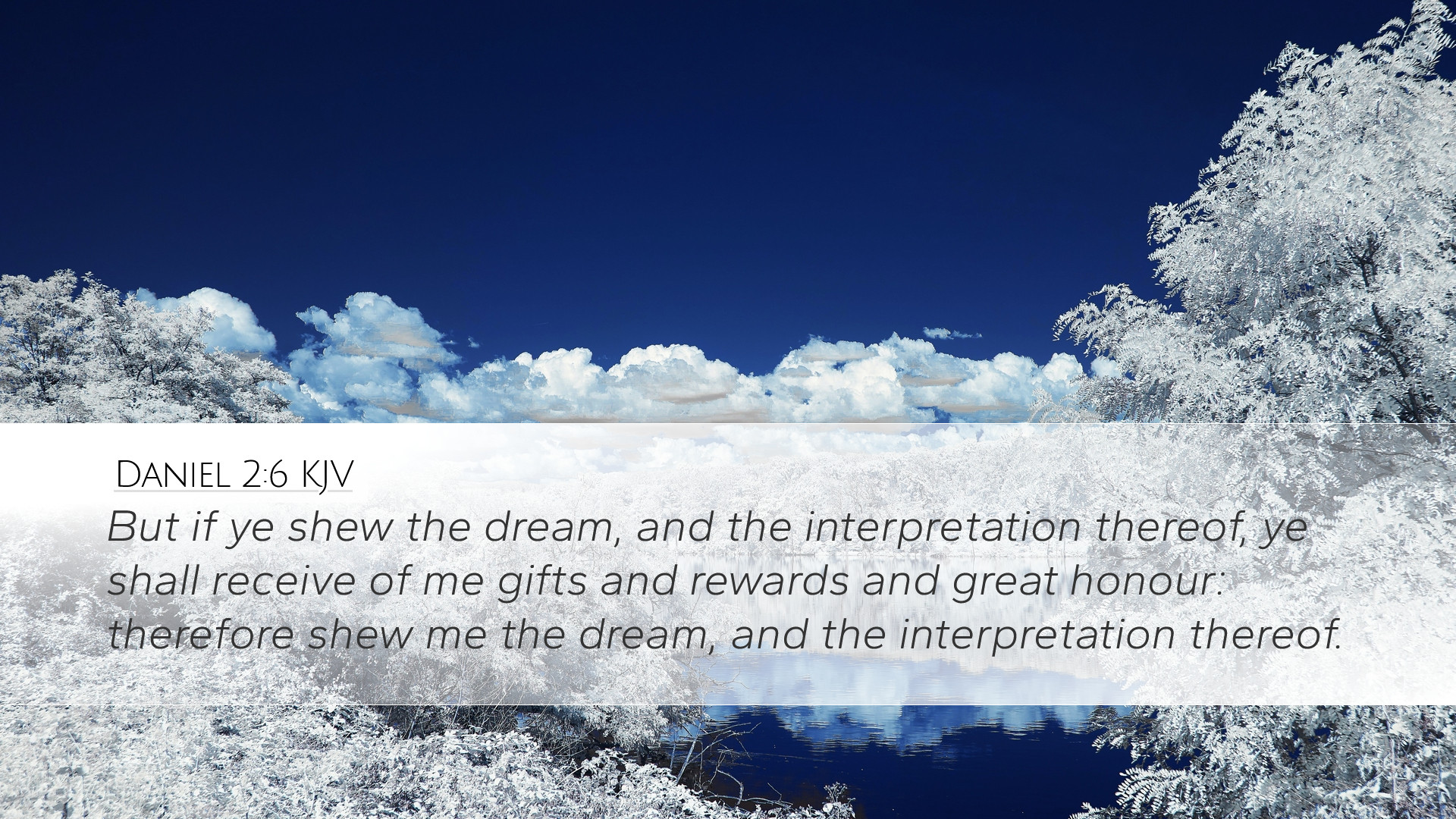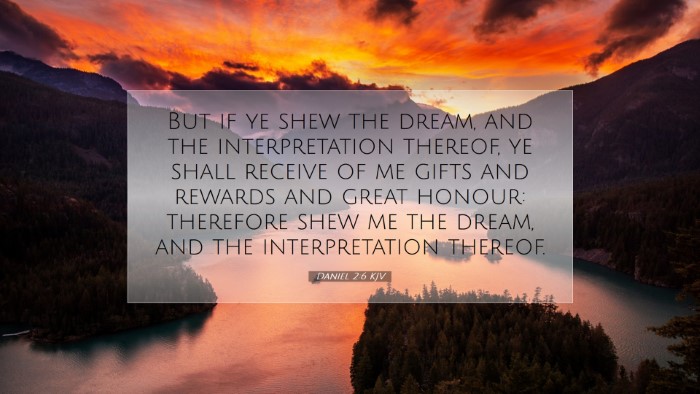Commentary on Daniel 2:6
Scripture Reference: Daniel 2:6 - "But if you can tell the dream and its interpretation, you shall receive from me gifts, rewards, and great honor; therefore tell me the dream and its interpretation."
Introduction
The Book of Daniel presents a profound blend of narrative and prophecy, skillfully demonstrating God's sovereignty over human affairs. Chapter 2 is pivotal, as it recounts Nebuchadnezzar's dream that leaves him troubled and demanding interpretation. The specific verse we are examining, Daniel 2:6, carries significant weight, reflecting the relationship between the king and his wise men, and setting a stage of desperation for both parties.
Contextual Understanding
To grasp the text, one must consider the historical setting in which the events occur. Nebuchadnezzar, the Babylonian king, was both a conqueror and a seeker of truth. His demand for not only the interpretation but also the dream itself reveals deep psychological and theological implications about wisdom, authority, and the quest for divine knowledge.
Matthew Henry's Commentary
Matthew Henry emphasizes the futility of human wisdom in the face of divine revelation. He notes that the king’s challenge to his magicians reflects a crisis of credibility. The wise men are expected to demonstrate genuine capability; otherwise, they are exposed as frauds. This verse illustrates that true insight must be divinely granted.
Albert Barnes' Commentary
Albert Barnes points out the implications of Nebuchadnezzar's demand. The phrase "if you can tell" indicates that the magicians were aware of the high stakes involved. Barnes observes that the repeated emphasis on the conditions of rewards aligns with the biblical theme of God honoring those who act faithfully. The king's desperation paves the way for Daniel's emergence as a faithful servant of the Most High God.
Adam Clarke's Commentary
Adam Clarke provides an interesting linguistic angle, explaining that the original language reflects the tension in the king’s demand. His insistence on both the dream and its interpretation signifies a challenge that transcends mere human capability. Clarke highlights the acknowledgment of a higher power, subtly indicating that the source of true wisdom must be divine. Furthermore, Clarke discusses how the king's proposal of gifts and rewards illustrates the ancient Near Eastern practice of honoring those who serve as mediators of knowledge.
Theological Insights
This passage holds significant theological implications for understanding God’s revelation and human limitations. The insistence on revealing the dream serves as a metaphor for God’s own revelations through prophecy. Just as the wise men are required to reveal the depths of knowledge, God desires that believers engage with His truth and seek divine wisdom actively.
- Divine vs. Human Wisdom:
The disparity between divine wisdom and human comprehension is evident throughout the text. Daniel’s eventual interpretation underscores the necessity of revelation from God, which no amount of human effort can replicate.
- Faithfulness in Adversity:
The situation presents a test not only for the Babylonian wise men but also for Daniel and his friends, who must remain faithful amidst the impending crisis. It illustrates the principle that God often places His servants in challenges that showcase His glory and providence.
Lessons for Pastors and Theologians
The complexity of Daniel 2:6 serves as a critical lesson for pastors and theologians alike:
- Preaching the Sovereignty of God:
This verse emphasizes God's sovereignty over all powers, illustrating that in moments of human frailty, God is in control.
- Encouragement in Desperation:
Pastors can encourage their congregations by exploring how God uses desperate circumstances to reveal His will and glory through His people.
- Application of Wisdom:
The importance of seeking divine wisdom through prayer and scripture study is a crucial takeaway for theological students and scholars.
Conclusion
In summary, Daniel 2:6 not only showcases the dramatic tension between Nebuchadnezzar and his wise men but also invites deeper reflection on divine revelation, human despair, and the overarching sovereignty of God. The insights drawn from public domain commentaries enrich our understanding and appreciation of this critical passage, encouraging all to look beyond human wisdom to divine truths that ultimately guide our faith journeys.


